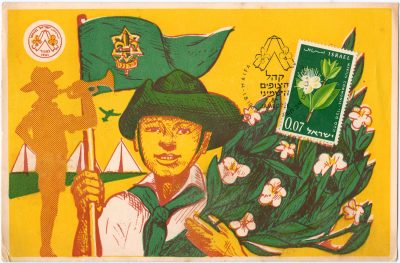×


We have detected your country as:
Please click here to go to the USA website or select another country from the dropdown list.
by: Janet Aslin, Staff Writer
It’s Friday afternoon in Beit HaKerem, the Jerusalem neighborhood where I live. There are fewer and fewer cars on the road as a pre-Shabbat (Sabbath) hush begins to descend. However, it’s a different story in the park on the other side of Herzl Boulevard, where an exuberantly noisy group of 20–30 young Israeli children are taking part in activities planned by teens only slightly older than they are. This is a gathering of Tzofim, or the Hebrew Scouts, and the activities are designed to develop responsible leaders with an unshakeable love for their country and its people.
Twice a week, approximately 90,000 young Israelis between the ages of 9 and 18 meet across the country in groups or tribes. Wearing khaki shirts with colorful neck scarves and led by the older teens of 15 to 18 years old, Tzofim is the nation’s largest youth movement. Affiliated with the World Organization of the Scout Movement since 1951, Tzofim has put a uniquely Israeli spin on the scouting experience, producing many of the nation’s leaders during its 100-year history.
 On Passover 1919, only ten years after a British army officer named Baden-Powell founded the world-wide scouting movement, a group of Jewish youth and sports associations in British Mandate Palestine held activities similar to those led by Baden-Powell, marking the start of the Hebrew Scouts. From the very beginning, Tzofim was uniquely Israeli, as it was the first movement to include both boys and girls, allowing equal participation.
On Passover 1919, only ten years after a British army officer named Baden-Powell founded the world-wide scouting movement, a group of Jewish youth and sports associations in British Mandate Palestine held activities similar to those led by Baden-Powell, marking the start of the Hebrew Scouts. From the very beginning, Tzofim was uniquely Israeli, as it was the first movement to include both boys and girls, allowing equal participation.
The first official Tzofim “tribe” was founded at the Reali school in Haifa in 1925. During the stressful and often violent pre-statehood days of the 1940s, the movement sent its best scouts to the Palmach, the elite fighting force of Israel’s underground army. Then, once the modern State of Israel was reborn in 1948, Tzofim graduates were sent to create new Jewish communities across the country, laboring to restore the land of their inheritance.
Today there are over 200 Tzofim groups in 105 cities and towns from Kiryat Shmona along the Lebanon border in northern Israel to its southernmost city of Eilat on the Red Sea. Approximately 40% of these groups are located in cities and towns that are struggling economically and whose populations include a high number of “at risk” children.
Tzofim members reflect the diversity of their country. There are sabras (native-born Israelis) and new immigrants; secular and religious; young people with special needs and youth at risk. They all take part in the activities and educational programs designed to produce citizens who feel like they belong and are committed, contributing members of the communities in which they live.
Weekly activities stress the Hebrew Scouts’ core values: positive young leadership; Jewish identity; and community building. Small groups, activities in nature, challenges and learning through experience are key to the process. Emphasis is placed on the importance of volunteering and improving the world in which they live.
 In the 1970s, the first Tzofim troop established for young Israeli children living abroad was formed in New York City. Known in the Diaspora (Jews living outside Israel) as Tzabar, activities follow the same model as its Israeli counterpart. Tzabar is now active across the US as well as Canada, Australia, Hong Kong, the Netherlands, UK and the former Soviet Union.
In the 1970s, the first Tzofim troop established for young Israeli children living abroad was formed in New York City. Known in the Diaspora (Jews living outside Israel) as Tzabar, activities follow the same model as its Israeli counterpart. Tzabar is now active across the US as well as Canada, Australia, Hong Kong, the Netherlands, UK and the former Soviet Union.
Designed to keep the children’s ties with Israel strong, activities are held in Hebrew. It’s also a two-way street. Each summer, a delegation of 10 Israeli scouts in their final year of Tzofim join the “Friendship Caravan.” These young Israelis travel across the US and Canada to bring a taste of their culture in the form of music and dance as well as a message of peace.
Tzofim is not limited to the under-18 age group though. Each year, young Jewish men and women leave the countries of their birth and come to serve in the Israel Defense Forces (IDF) as Lone Soldiers. In 1991, a special Israeli Scouts program, Garin Tzabar, was formed to provide a support system for some of these Lone Soldiers.
Remaining on base over the weekend is not always possible in the IDF, but soldiers who come from abroad and do not have family in Israel have limited options of where to spend their free time. This special Tzofim group adopts and places groups (garin) of Lone Soldiers in kibbutzim [collective communities] and cities where they are assigned to adoptive Israeli families. This gives them a “home away from home” where they can improve their Hebrew, be part of Israeli culture and get their laundry done! Having this family can make all the difference in the world.
Approximately 400,000 Tzofim graduates live in Israel today. Some of them are well-known, such as Prime Minister Benjamin Netanyahu and IDF Chief of Staff Herzi Halevi. Not every graduate becomes a household name in Israel, but through Tzofim’s educational programs and core values instilled from a young age, they do become community-minded and responsible citizens. The list of the “Scout’s Ten Values” is a good summary of the character being built in the exuberantly noisy groups that meet each week across the Land of Israel.
Photo Credit: Click on photo for photo credit
All logos and trademarks in this site are property of their respective owner. All other materials are property of Bridges for Peace. Copyright © 2024.
Website Site Design by J-Town Internet Services Ltd. - Based in Jerusalem and Serving the World.